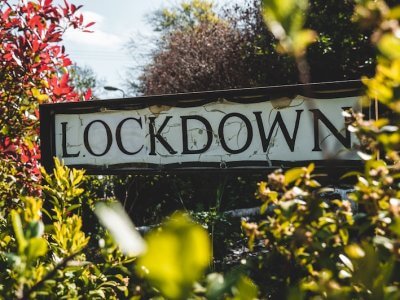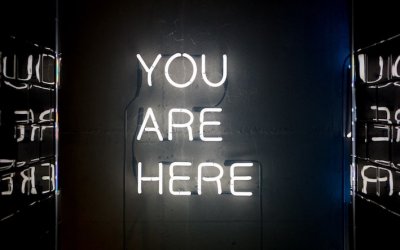Why Second Lockdown Stress is Worse (And 7 Ways to Deal)

photo by Matt Seymour
by Andrea Blundell
The first Covid19 lockdown was an out of nowhere, once in a lifetime experience. Except… it wasn’t. It’s happening again. And so is your anxiety and stress. Why are you feeling so bad? Shouldn’t you know how to deal by now?
Second lockdown stress
Just like this lockdown is in some ways different than the first, so are our reasons to be stressed. And there are more things to be anxious about.
1.You actually know what is coming.
New experiences and not knowing what is coming next are stressful.
But at least in the last lockdown you could talk yourself out of panic attacks by telling yourself it might not be as bad as you think.
This time, you know what’s ahead. You can’t pretend it’s romantic to stay at home. As for the virus, there is no pretending it will suddenly disappear, or that a vaccine will save the day.
2. We aren’t all in it together anymore.
The first lockdown was hard, but a bonding experience. All that pot banging and camaraderie. We were all dealing with something new and strange.
Now, it’s a time of division and polarisation. We can find ourselves in disputes with those we love over things like mask use, if the virus is or isn’t real, and what we should and shouldn’t obey about lockdown.
3. It’s more out of control.
Before, there was still a semblance of belief that governments were informed. Now it’s a clear fact that governments are making good guesses, and still don’t completely understand the coronavirus. Plus you are being hit by vague, confusing rules.
You might feel an anxiety that is less intense than the first lockdown, but more persistent.Things can feel more pointless, more hopeless, than ever before.
4. The fatigue is more intense.

By Camila Quintero
There is no spring or summer ahead to look forward to. And there is a chance this is going to keep on happening, that the future is on and off lockdowns.
5. It’s coming alongside flu, colds, and ‘SAD’.
Flu and colds can also affect your mental health. You can feel despondent and low. And if you suffer from seasonal affective disorder (SAD), this second lockdown coincides with the popular times to have symptoms.
So it’s not just sitting at home more, it’s sitting at home more right when you already get depression and hate being alone.
6. Shame and self blame can be the game.
You knew what didn’t work the first time. And you promised yourself you’d be ready just in case it ever happened again. You’d find a countryside getaway! Get into a couple and stop being so single! But here you are, in the same situation.
Or you didn’t believe it would come back and now you are angry at yourself. How can you be so stupid? You feel angry, ashamed.
7. The kids are at school this time.
Wait, isn’t that a positive? Yes. Unless you have any issues the kids helped you avoid facing last lockdown.
If you avoided seeing the cracks in your marriage by being focussed on the kids all day, and now you are stuck working at home with your partner? Or your kids help you avoid the anxiety and depression waiting beneath the surface? With this second lockdown there is no hiding.
So how to deal with lockdown, round two?
1. Don’t assume it will be exactly like the last one.
Assumptions and fortune telling only shut down our mind to new opportunity. You simply don’t know what might happen over the next few months. Good things and surprises can still come your way, even in lockdown.
2. Be honest if it’s not actually lockdown that’s the problem.
Second lockdown can be the perfect excuse for our low mood when really it’s that we realise we want out of our relationship, or to change job, or move country. We won’t feel better until we admit the real issue.
Lockdown can even be helping you mood, not hindering it. A study out of Cambridge found that it was the pandemic itself that caused low moods, not having to stay home, which actually saw moods rise as people felt safer. And there was a rise in life satisfaction for the average family, with only top professionals seeing a drop.
3. Instead of the future, focus on the here and now.

photo by John baker
Focusing on the holidays and success you’ll have ‘once Covid ends’ can make the lockdown seem more unbearable.
Focussing on what is working right here and now takes more effort. You might have to focus on small wins on some days.
But it’s a form of mindfulness. And mindfulness is shown by an extensive body of research to have such positive affects as lowering anxiety and improving your attention.
Take it further by starting a mindfulness meditation practise – learn how here.
4. Compare down.
Most of us compare ‘up’. We compare ourselves to people who are doing better than us and then wonder why we feel rubbish.
It’s acceptable to cut yourself some slack and privately compare down. To notice that you are managing better than others. That it could be far worse. You are still healthy, you have friends, you aren’t living in a shack with twenty other people.
5. Go for being grumpy.
Repressing how we actually feel just means we end up physically sick with colds and flu, or lashing out at those we love.
It’s not about not being miserable. It’s about processing and dealing with your misery in a productive and non damaging way. Which means not calling your friends only to moan or complain, not picking a fight about nothing with your partner, and not screaming at your kids.
Instead, try things like journalling with intent, short bursts of aggressive exercise like HIIT or boxing, or timed rants, where you set a timer for three minutes and have to scream out all the things annoying you without stopping (you’ll be amazed how quickly you run out of steam).
6. Work on your relationships (or celebrate aloneness!).
The last lockdown was like a big light exposing the hidden corners of our relationships. We figured out fast who our real friends were, or if our romance had long term potential.
An Austrian study found that during the last lockdown, a bad relationship more than doubled your chance of depression symptoms, from 13% up to 35%. And people were found to be happier during lockdown with no relationship at all than a bad one.
Your relationships that are still around are likely to last. Why not invest in some better communication and connection?
7. Get real support this time.
When you work with a counsellor or psychotherapist, there is no guilt. You are paying them, after all. And there is no worry about upsetting someone. They are impartial. Plus they know how to listen in a way even well-meaning friends don’t, and can help you find answers and ways forward that you’ll wish you had seen ages ago.
Ready to stop the stress and start feeling you’ve got this? Many of our highly rated and expert London-based therapists are now available over the internet. Or use our booking platform to find UK-wide registered online and in-person therapists to suit your budget.
Have your own second lockdown tip for our readers? Share it in the comment box below.




